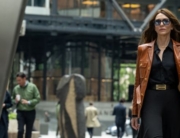![]() Taxi is the third unauthorized (and fascinating) film Jafar Panahi has completed (and smuggled out of Iran) since late 2010, when its government handed down a 20-year ban on him directing any movies, writing screenplays, or giving any media interviews. Like This Is Not a Film (2011) and Closed Curtain (2013), this is not just a powerful lesson in creative determination and censorship defiance but an absorbing look at humanity, full of poignancy and humor.
Taxi is the third unauthorized (and fascinating) film Jafar Panahi has completed (and smuggled out of Iran) since late 2010, when its government handed down a 20-year ban on him directing any movies, writing screenplays, or giving any media interviews. Like This Is Not a Film (2011) and Closed Curtain (2013), this is not just a powerful lesson in creative determination and censorship defiance but an absorbing look at humanity, full of poignancy and humor.
Over the course of one day, Panahi drives a cab through commercial boulevards and residential streets of Tehran, full of young people in T-shirts and jeans, with a digital camera attached to his dashboard. The power of mobile video is usually associated with documentaries, and some have assumed this is one as well, but with no credits allowed to protect the other participants, this film is just as likely to be a hybrid, with spontaneous coincidences felicitously interrupting planned sequences. Or not.
Any hope that the government may have had that this could be Panahi’s new day job will be dashed. More than one passenger lets him know he’s a lousy cabdriver for not knowing neighborhoods outside his comfort zone, even with a GPS, and for not driving more aggressively. (Allegorical potential intent abounds.) Some pushy passengers are so fed up that they practically commandeer his cab to go further than he wants—somehow their destination is always “just to the next bridge.”
He also gets caught up in emergencies. His cab becomes an ambulance for an accident victim, and the panicked wife pours out the travails of her and her husband’s finances and relationship as she tries to get the driver more and more involved in their lives. Two elderly, traditionally dressed women are endearing in their spiritual crisis, only gradually confessing why they absolutely must get to a certain sacred spring before it closes. Their simple, intensely personal faith is probably intended as a contrast to those who use religion for political gain.
Panahi is occasionally recognized by film fans who call their friends with the news. (Everyone seems to be on the phone half the time.) A former video store clerk takes credit for Panahi’s film education by proudly remembering how he got hold of European films that influenced the director’s work. So as a persistent producer of pirated DVDs, he assumes Panahi should be a good customer and figures he maybe could be a salesman for him.
This ingenious film itself could serve as an answer to the complaint made by another passenger, an obnoxious film student who whines that he can’t think of a good idea for his thesis project. This young man tries to take over directing the movie, perhaps as a representative of the next generation. One of the film’s many phone calls is from an adorable little girl in a head scarf and backpack, who may or may not really be Panahi’s niece, who’s furious that he’s late picking her up from school. She blithely prattles on about a film she wants to make for a big school assignment, but she struggles to understand the teacher’s long list of Islamic censorship restrictions that have to be met in order to qualify for a prize.
She enthusiastically gets right into the spirit of her homework by grabbing Panahi’s camera to document everything and everyone around her. Through the viewfinder, she looks out from the cab—at a poor boy dumpster-diving for food and a friend of her grandfather’s talking nostalgically about the old neighborhood. When the girl is tempted into putting down the camera in exchange for an ice cream soda (more symbolism of buying off protests with material goods?), the audience feels for her safety and her future, as well as Iran’s. As long as Panahi’s camera keeps filming, hope lives.
Written, Produced, and Directed by Jafar Panahi
Released by Kino Lorber
Farsi with English subtitles
Iran. 82 min. Not rated

















Leave A Comment